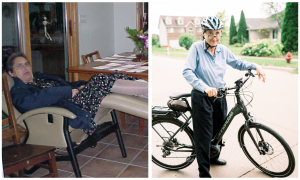Remyelination Workshops:
Learn How to Heal Your Brain and Feel Better
Learn the research-backed blueprint for repairing myelin and re-igniting the nervous system.
Remyelination Workshops:
Learn How to Heal Your Brain and Feel Better
Learn the research-backed blueprint for repairing myelin and re-igniting the nervous system.
The Important Role of Myelin:
Myelin is damaged in a wide variety of conditions, including autoimmune conditions, infection, trauma, neurodegeneration (as in Alzheimer’s or Parkinson’s), and simply aging. The result of this damage can lead to changes in mood and memory, sensory disturbance, pain, weakness, incoordination, heat intolerance, balance problems, dizziness, and recurrent vomiting that can be constant or intermittent.
Billions of dollars are being spent on developing drugs that improve the body’s ability to repair damaged myelin, and currently, there are several drugs that have been shown to improve myelin repair in animal models.
To understand the important role myelin plays in our health and how we can create an optimal environment that promotes healthy myelin and reduces the risk of disease, I have created this 12-part series. In it, you’ll learn what myelin is, how it’s made, what damages it, and how it can be repaired, and there will be time for questions.
After completing this course, attendees will have a more complete understanding of the biology of myelin, how drugs come to market, which remyelination drugs have early promising data, which natural products have early promising data, and why drugs and products that work in animal models typically fail in human trials.
In addition, you will gain a greater understanding of the factors that create a neurotoxic environment that increases the severity of myelin damage as well as the behaviors that promote myelin health and repair.
Bundle And Save!
Get access to both workshops for only $597
Remyelination Workshop | Remyelination Advanced Workshop
What is covered in the Workshop:
Remyelination Workshop:
Remyelination Advanced Workshop:
Remyelination Workshop:
Remyelination Advanced Workshop:
Restoring Function Workshop:
We’ll explore in detail what you can do to improve the environment for myelin repair, including specific recommendations for health behaviors, foods, and supplements that support remyelination.
You will be empowered with knowledge, inspiration, and awareness of specific actions they can take to stop demyelination processes and improve their body’s ability to repair myelin.
Who will benefit from this workshop?
This workshop is designed for people with a neuroimmune or autoimmune process affecting their brain, spinal cord, or nerves. Brain, spinal cord, and peripheral autoimmune disorders include, but are not limited to, optic neuritis, neuromyelitis optica, acute disseminated encephalomyelitis, multiple sclerosis, transverse myelitis, neuro-sarcoidosis, Neuro-Behcet’s, Hashimoto’s, vasculitis, rheumatoid arthritis, systemic lupus, Sjogren’s syndrome, and chronic inflammatory demyelinating polyneuropathy.
This workshop is also for people who have had damage to their myelin through traumatic brain injury or post-brain/spinal cord infections, such as chronic Lyme disease or other tick-borne infections. The course will also be useful for anyone who wants more strategies for healthy aging, because damage to myelin accumulates and the ability to repair that damage declines as we age
This workshop will increase your confidence in approaching your health challenges related to damaged myelin, whether that’s from rounds of cancer chemotherapy, post-infection damage, traumatic brain injury, or an autoimmune disorder.
Enroll today and make the most important investment you can right now—in your health.
My Promise To You
I promise you, that if you commit to your health, join me as your guide, YOU WILL see improved outcomes, learn exactly how your body responds, and regain control over how you feel everyday—just like how I did and how thousands of other Wahls Warriors™ already have.
- REMYELINATION ADVANCED$227OCTOBER 16-17, 9:30-1:30 CT
Join us via ZOOM
OCTOBER 16-17, 9:30-1:30 CT
-
Part 7: Understand the Role of Your Life and Health Timeline in Your Current Health Issues.
-
Part 8: Improving Gut Health*
-
Part 9: Growing Your Internal Motivation to Improve Your Health Behaviors
-
Part 10: How to Utilize a Health Coach to Increase Your Success with Adopting and Sustaining Health Behavior Change
-
Part 11: How to Utilize Validated Questionnaires and Biomarkers to Assess Your Cellular Function and Support Your Remyelination and Wellness Plan
-
Part 12: How to Conduct a Variety of Functional Tests on Yourself with the Help of Your Family
-
Feel supported while learning how your daily actions impact your myelin.
-
Learn a functional medicine AND conventional medicine approach to remyelination
-
All modules are recorded and can be accessed in The Wahls Academy
-
Maintain access to course materials forever
-
- REMYELINATION WORKSHOP$227GET THE REPLAY
GET THE REPLAY
-
Part 1: How Myelin Is Made
-
Part 2: The Exciting New Myelination Drugs
-
Part 3: Natural Products and Remyelination
-
Part 4: How microglia, astrocytes, and microenvironment affect myelination and why new drugs may not help humans
-
Part 5: Calming Your Microglia
-
Part 6: The 3 M’s: Microbiome, Mitochondria, and Microenvironment
-
Feel supported while learning how your daily actions impact your myelin.
-
Learn a functional medicine AND conventional medicine approach to remyelination
-
All modules are recorded and can be accessed in The Wahls Academy
-
Maintain access to course materials forever
-
- RESTORING FUNCTION$227NOVEMBER 13-14, 9:30 am-1:30 pm CT
Join us via ZOOM
NOVEMBER 13-14, 9:30-1:30 CT
-
PART 1: Restoring The Workplace: How to Request Accommodations or Apply for Disability
-
PART 2: Restoring Everyday Life: How Occupational Therapy Can Help
-
PART 3: Restoring Movement: How Physical Therapy Can Keep You Moving
-
PART 4: Restoring Muscle Function: How Electrical Stimulation Works
-
PART 5: Restoring The Nervous System: The Latest Technologies
-
PART 6: Restoring Workplace Function: Addressing the Most Common Drivers of Job Loss
-
PART 7: Restoring The Body: Addressing Bladder, Bowel, and Sexual Issues
-
Feel supported while learning how your daily actions impact your myelin.
-
Learn a functional medicine AND conventional medicine approach to remyelination
-
All modules are recorded and can be accessed in The Wahls Academy
-
Maintain access to course materials forever
-
Set yourself up for success:
A guided autoimmune intervention is the first place to begin your journey to greater health. This course will save you time and money in the long run. Here’s how:
Scenario #1: Only follow conventional medicine
The cost for autoimmune care is $100 billion/year in the United States, with many drugs costing between $50,000 and $100,000 per year for the duration of the patient’s life.
In addition, these drugs often come with debilitating known side effects including damage to liver, heart or kidneys, infection, leukemia or lymphoma, just to name a few. Despite the financial burden and serious health risks of these drugs, patients and families often are more afraid of worsening disability and desperately take these medications.
When patients begin a diet and lifestyle intervention after starting a disease-modifying drug, it is often harder for the patient to ever be free from having to take drugs without facing severe worsening of their autoimmune disease.
The diet and lifestyle interventions covered in this course are designed to complement to your current disease-modifying therapy and will potentially make your current treatment plan more effective.
 Scenario #2: Hire a functional medicine provider
Scenario #2: Hire a functional medicine provider
Functional medicine is often cash-based and not covered by insurance. Implementing the Autoimmune Intervention Mastery course before you start working with a functional medicine practitioner will save you time and money.
This proven behavior change model will jumpstart your new approach to managing your health. Your time spent with your functional or integrative medicine doctor can be used more efficiently by starting these health behavior changes ahead of time.
Imagine being able to begin your health transformation right now by learning about functional medicine and following a proven pathway to creating new health behaviors.
After taking the Autoimmune Intervention Mastery Course, your practitioner will be able to focus on supporting you at a deeper level with their expertise.
FAQ's
If you want to get to the root cause of condition or disease and create new, permanent health behaviors—then yes, this course is for you!
You’ll get the most out of the AIM course if you’ve read Dr. Terry Wahls’ bestseller, The Wahls Protocol®, and want to get more instruction, depth, and nuance when creating your own personalized wellness protocol.
Inside the AIM course, you’ll find guidance for putting diet and lifestyle interventions to use in your life. The AIM course benefits those seeking better health of all stripes. Everyone can benefit from this information, and this program will show you how to leverage it to create a new lifestyle of meaning, confidence, optimism and health.
The Autoimmune Intervention Mastery course is a 5-module DIY program walking you through every detail of creating better health habits and behaviors backed by science.
The course will ask you to reflect honestly and deeply throughout the process, so the time you take is up to you. These changes take time, effort, and commitment—I recommend working on one module a week.
You’ll get access to video lessons, audios, transcripts, and detailed workbooks with thought-provoking questions, examples, and instructions for each module. Every aspect of the program is delivered virtually, so you can complete it at your own pace, from anywhere in the world. You’ll be able to join a supportive Facebook too. All of that for a $497 investment.
Okay, wellness warrior — you’re ready to kick this process off. Your first step to joining the Autoimmune Intervention Mastery is to purchase the course. Once you do so, you’ll be redirected to a landing page to get started!
When you’re committed to creating better health, you want Dr. Terry Wahls to lead you along the way.
Her method has become a sensation, transforming the lives of people with autoimmune diseases. Dr. Terry Wahls outlines the latest research that validates the program and offers new, powerful behavior modification tools to help you achieve optimal health.
The Wahls Protocol, A Radical New Way to Treat All Chronic Autoimmune Conditions Using Paleo Principles comes out of Dr. Wahls’ own quest to treat the debilitating symptoms she experiences as a sufferer of progressive MS.
Informed by science, she began using Paleo principles as guidelines for her unique, nutrient-rich plan. This book shares Dr. Wahls’ astonishing personal story of recovery and details the program, with up-to-date research she’s now conducting at the University of Iowa.

Dr. Wahls has been featured on the television show The Doctors, in Reader’s Digest, and other widely read publications.
The information in this workshop was informed by the research she has used in her primary care clinics, traumatic brain injury clinics, and therapeutic lifestyle clinics at the Iowa City Veteran Affairs Hospital. She also uses this program in her clinical trials and in her private practice.
While your health care team can tell you what you need to do to master autoimmune dysfunction—Dr. Wahls will show you how to do master your diet, lifestyle, and environment to usher in a new future of hope and healing.
This web site offers health, wellness, fitness and nutritional information and is provided for informational purposes only. This information is not intended as a substitute for the advice provided by your physician or other healthcare professional. You should not rely on this information as a substitute for, nor does it replace, professional medical advice, diagnosis, or treatment, Always speak with your physician or other healthcare professional before taking any medication or nutritional, herbal or homeopathic supplement, or using any treatment for a health problem. If you have or suspect that you have a medical problem, contact your health care provider promptly. Do not disregard professional medical advice or delay in seeking professional advice because of something you have read on this web site. The use of any information provided on this web site is solely at your own risk. Nothing stated or posted on this web site or available through any services offered by Dr. Terry Wahls and Dr. Terry Wahls, LLC, are intended to be, and must not be taken to be, the practice of medicine. Information provided on this web site DOES NOT create a doctor-patient relationship between you and any doctor affiliated with our web site. Information and statements regarding dietary supplements have not been evaluated by the Food and Drug Administration and are not intended to diagnose, treat, cure, or prevent any disease.
